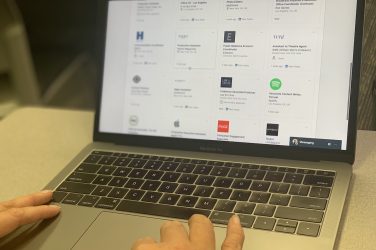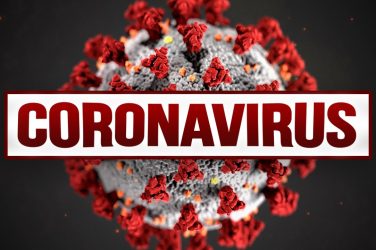Food is a basic necessity that 100 percent of people need and roughly 13 percent of people in the United States struggle to afford, according to the Center on Budget and Policy Priorities. In Athens-Clarke County, nearly 22 percent of the population struggles to afford food, according to Feeding America. However, with help from the Supplemental Nutrition Assistance Program, or SNAP, many of these people do not go hungry.
SNAP benefits are a way for people facing food insecurity to purchase food for their families, however, there are few restrictions on what those benefits can be used to purchase. Some people also find it overwhelming to find recipes and cook meals that they can afford, which is why nutrition education is important, especially as a component of SNAP benefits.
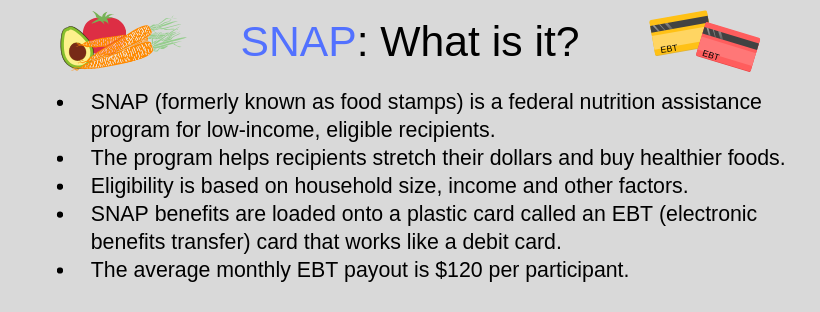
Over the past few months, I’ve spoken with sources across Clarke County about food insecurity and how organizations within the community are working to alleviate the issue. Something that has not yet been touched on in my research is nutrition education, which is a very important aspect of food insecurity that is not talked about enough. However, organizations at the University of Georgia and researchers and educators out of the Family and Consumer Sciences department at the University of Georgia are talking about it, and more than that, they’re teaching people in and outside of Clarke County the importance of nutrition education.
Starting with the Numbers
In 2018, the United States had a food insecurity rate of 12.9 percent, a number that had decreased from 15.4 percent in 2015, according to Feeding America. Although the food insecurity rate has decreased, there is still a large population of people who are living without the proper nutrition that they need.
Food insecurity is defined by the USDA Economic Research Service as “a household-level economic and social condition of limited or uncertain access to adequate food.” In other words, people and families who are food insecure do not have access to enough nutritious foods for a healthy life due to a lack of financial or other resources. This is why food insecurity and poverty often go hand-in-hand.
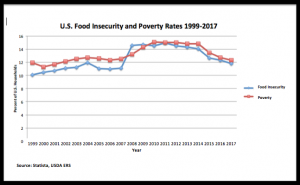
David Berle, an associate professor of Horticulture at UGA, said that in addressing food insecurity, it’s important to take into account poverty and nutrition education.
“I think it helps more to think about food insecurity as a function of poverty and, to some extent, nutrition education and public health, and then look at how those issues can be addressed,” said Berle. “It’s time to move past making maps of areas where fresh produce is not available and look at barriers to being able to afford to purchase and prepare healthier food.”
Locally, the food insecurity rate in Athens-Clarke County is higher than the rate in Georgia and the U.S. at 21.6 percent, according to Feeding America. Athens also has a strikingly high poverty rate at 34.4 percent, which is higher than the poverty rates of Georgia and the U.S. combined.
I discussed the high food insecurity rate in Athens-Clarke County and the issues of food deserts in the area in a series of tweets. You can find that thread here:
1/ Thread: Georgia has a food insecurity rate of roughly 15%, which, according to the U.S. Department of Agriculture, means that 15% of Georgians lack consistent access to enough food for a healthy life. In Clarke County, Georgia, that percentage jumps to 22%. But why? pic.twitter.com/5ESob9FCjI
— Margaret Pfohl (@MargaretPfohl) April 4, 2019
Lending a Helping Hand
The high number of residents living in poverty, and many without food, is why many organizations in Athens are doing what they can to lower those statistics. Organizations like the Food Bank of Northeast Georgia, the Athens Area Emergency Food Bank and the Little Free Pantries that are dispersed across the county aim to provide groceries and meals to families in Athens. At the University of Georgia, organizations like Campus Kitchen and UGArden are providing sustainable solutions to the issues of poverty and food insecurity with the help of students.
UGArden is a teaching garden for students to learn and practice growing food using organic practices through experiential learning. A majority of the food that is grown in the garden is sent to Campus Kitchen to be used in cooking meals or to be delivered straight to the recipients. Campus Kitchen is a student-powered hunger relief program that finds sustainable solutions to hunger and food waste while providing groceries and meals to older food insecure individuals across the county.
I spent a day with Campus Kitchen following along as they picked up groceries from Trader Joe’s, sorted produce, created recipes, cooked meals and delivered the groceries and meals to recipients. You can find those photos here:

SNAPping into Action
While Campus Kitchen and UGArden are providing food for those who do not have the resources to access it, there are other programs that focus on nutrition education and how people can purchase and cook their own healthy meals.
SNAP-Ed, or Supplemental Nutrition Assistance Program Education, is a grant program at UGA that teaches people using or who are eligible for SNAP benefits about good nutrition and how to make their food dollars stretch further. The overall goal of SNAP-Ed is to improve the likelihood that people who are eligible or receiving SNAP benefits will make healthier food and lifestyle choices that, in turn, prevent obesity, said Laurel Sanville, the Assistant Nutrition Educator of SNAP-Ed.
“We’re trying to help people make good decisions about food and what to do with fresh produce when they get it from UGArden,” said Sanville. “I see that as our role, education.”
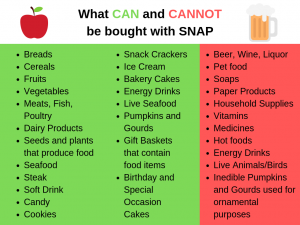
SNAP benefits can be used to purchase many healthful food items, however, they can also be used to purchase items like candy and soft drinks. SNAP-Ed’s goal is to educate eligible SNAP participants on how to eat healthfully and on a budget in order to improve the likelihood that they will make healthy food and lifestyle choices.
SNAP-Ed is funded through the Nutrition Education and Obesity Prevention Grant Program in the Healthy, Hunger-Free Kids Act of 2010 and is the responsibility of state agencies and implementing agencies.
A State agency, meaning “the State government that is responsible for the administration of the federally aided public assistance programs within the State,” according to the SNAP-Ed website, has the option of providing SNAP-Ed to SNAP recipients as part of their SNAP operations. They are also responsible for all SNAP-Ed activities that occur within a State as they’re outlined in an approved SNAP-Ed Plan.
Implementing Agencies work alongside State agencies to provide SNAP-Ed and can include Cooperative Extension offices, universities, State departments of health or education, State level nutrition networks, food banks and other organizations.
In Georgia, the State agency is the Department of Family and Children Services in the Georgia Department of Human Resources. There are also four implementing agencies across the state, including the Georgia Department of Public Health in Atlanta, Open Hand Atlanta, Health M Powers in Norcross and The University of Georgia College of Family and Consumer Sciences here in Athens.
SNAP-Ed at UGA
Established in 2013, the SNAP-Ed program at UGA began with a $1.7 million grant given by the U.S. Department of Agriculture to a group of researchers, led by a faculty member in the UGA College of Family and Consumer Sciences, at the university.
Since then, SNAP-Ed has expanded its current Food Talk program, which provides free recipes, exercise and cooking videos and access to blog posts about healthy living, including posts about meal planning, whether or not the ketogenic diet is healthy and tips on how to shop for healthful foods on a budget.
The Food Talk curriculum also includes free in-person and online classes for people who are eligible for SNAP benefits. The in-person classes are instructed by a nutrition expert and focus on tips to eat more healthfully, feed a family on a budget, proper food safety measures and how to make a new recipe. These classes are currently being held in seven counties, including Athens-Clarke County, Bartow County, Clayton County, Fulton County, Coffee County, Dekalb County and Gilmer County.
The SNAP-Ed Food Talk program also includes Food eTalk, which is the online version of the Food Talk curriculum, which includes six interactive learning modules that teach participants how to manage limited resources and stretch food dollars and plan menus and meals.
SNAP-Ed also focuses on social marketing through various social media platforms, including Facebook and Instagram.
“It’s getting harder and harder to get people to come to classes, and that’s why we’re trying to move into the online realm, and we do have a pretty strong presence now across multiple platforms,” said Sanville. “Our population, the low-income population, spends the most time on Facebook, but we’re upping our presence on Instagram with our eTalk program.”
Having a strong online presence means reaching more Georgians, which means more people learning how to live healthier lives.
“We do rigorous research, and everything we do is evidence based. So before we created our online modules, we did needs assessments across the state, and what we learned is that cellphones are the platform,” said Sanville. “Because we’re only in eight directed counties and there are 159 counties in the state of Georgia, we had to figure out how to strengthen that reach.”
A Prescription for Nutrition
SNAP-Ed also partnered with the Athens Farmers Market, Envision Athens, St. Mary’s Hospital, Piedmont Athens Regional, the UGA Department of Crop and Soil Sciences, UGA College of Public Health and the UGA Office of Sustainability to run the FARM Rx, previously FVRx, program with the help of Wholesome Wave Georgia, which provided funding for the program. FARM Rx, or the Food As Real Medicine Rx Program, is helping to alleviate food insecurity in the community by providing participants access to fresh, local produce in order to improve diet quality and guard against future diet-related diseases.
“Wholesome Wave provided the money for the participants to get $1 per day per person in their household, so for a family of four, they could get up to $28 per week,” said Sanville. “We connected them with healthcare through the Athens Nurses Clinic, and then through the Athens Farmers Market they could go get fresh produce.”
Participants receive “prescriptions” from healthcare providers in Athens which can be redeemed at the Athens Farmers Market for fresh, local produce. Before they can redeem their prescriptions, they must commit to nutrition and physical activity lessons, financial literacy classes and nutrition and physical education classes, which are provided by SNAP-Ed.
Sanville said that a participants height, weight and blood pressure were also measured throughout the program to highlight how fresh and healthful food consumption can impact a participant’s health.
Nutrition Education in Schools
UGA is also implementing nutrition education into its UGA Extension program called Grow It Know it that teaches local middle school students about sustainability and healthy eating through experiential education activities and cafeteria food waste reduction programs.

Tess Wilson, a current AmeriCorps VISTA service member, is in charge of this program at Clarke Middle School. She said that understanding the value of school gardens and recognizing that “Athens is a community that deals with a lot of food insecurity and we need to feed students and help them feed themselves” is important to understanding how to alleviate the issue through nutrition education.
According to Wick Prichard, the Grow It Know It Coordinator, “long term, kids are going to be better off, those who are food insecure or are insecure, if they know more about the food system,” which is why they have chosen to focus on nutrition education through agriculture, specifically teaching kids how to grow their own food sustainably.
You can learn more about Grow It Know It by listening to my audio piece where I spoke with Wick Prichard and Tess Wilson about the program at Clarke Middle School in Athens:
The Power of Nutrition Education
Putting food on the table should be about more than just having something to eat, but for some, that’s their reality. By educating people who are facing food insecurity, organizations like Food Talk and Grow It Know It are giving people the confidence to purchase healthier groceries and make recipes that are both affordable and nutritious.
There are many different components to food insecurity, and nutrition education is an important one that has the power to reshape a person’s views of what they can do for themselves and their families even if they’re facing a burden like food insecurity.
“There’s a real need for these resources,” said Sanville. “The more we can get people to shift away from the fast food, the easy quick fix food, to preparing a meal at home with wholesome ingredients, the healthier they’re going to be.”
Margaret Pfohl is a junior majoring in journalism and international affairs at the University of Georgia.






